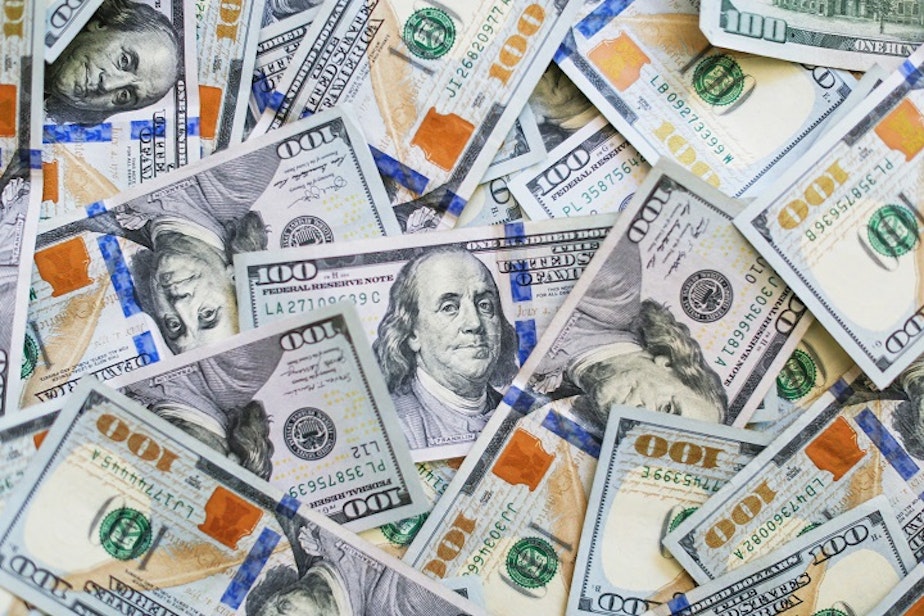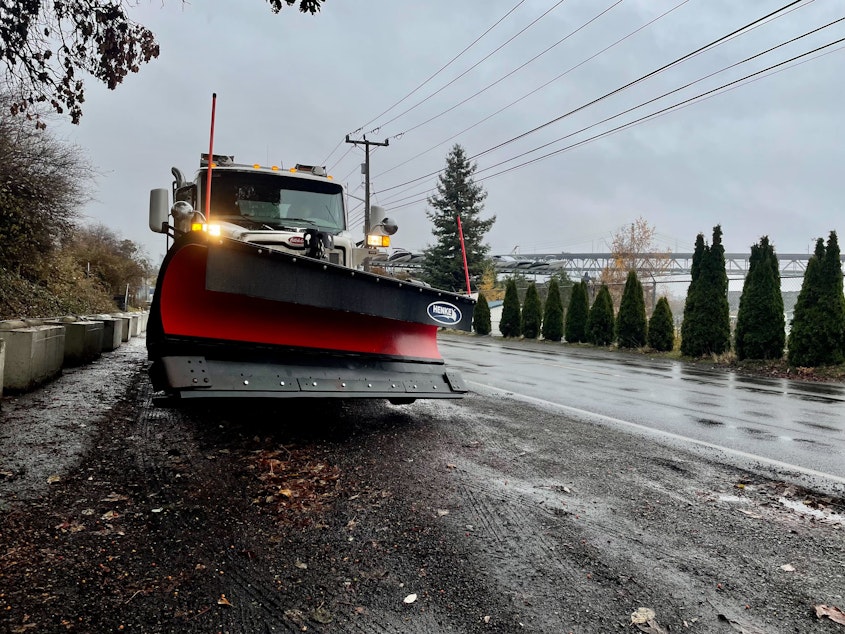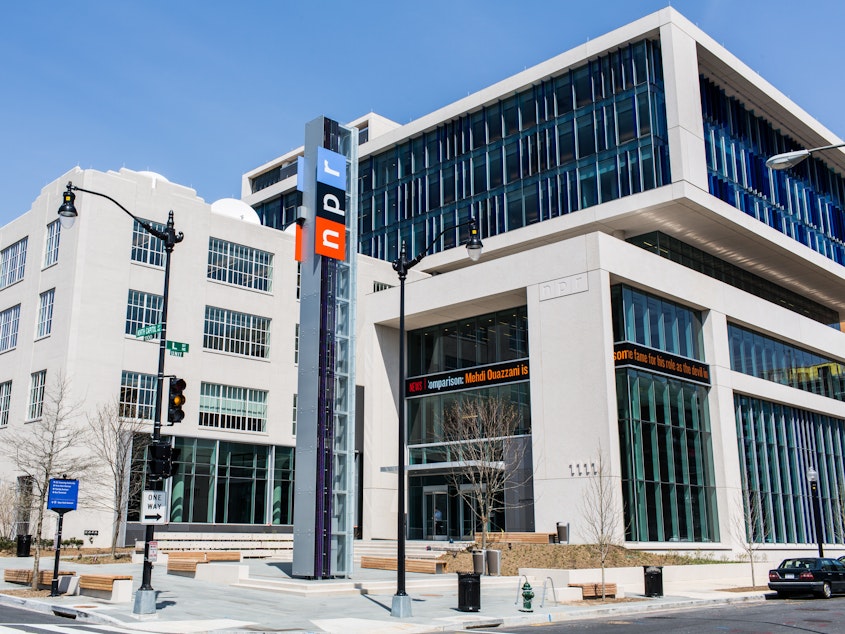Where can Seattle find more money?: Today So Far

Seattle just passed its budget, but officials still say the city needs to find new revenue to make up for funding gaps. Here are a few ideas.
This post originally appeared in KUOW's Today So Far newsletter for October 30, 2022.
While the region was dealing with snow, ice, and rain yesterday, the Seattle City Council passed its biennial budget. For those who hit snooze whenever news about numbers and budgets comes along, this basically lays out how the city is going to pay its bills over 2023-24.
This is a lot like when you're trying to figure out how to pay for your own bills in Seattle each month — add up your income, then consider your costs like rent, credit card bills, food, gas, and so forth. It's about setting priorities through what you pay for. And just like how many Seattleites these days figure they will pay rent first, and then maybe nix paying things like gas, food, credit cards (it's funny because it's terribly sad), the city is dealing with its own financial shortfalls.
"We knew that it was possible that there would be a downturn, but specifically there was a downturn of $64 million in the real estate excise tax," Council budget chair Teresa Mosqueda told KUOW's Soundside. "This is funding for projects that are core to our city's infrastructure, capital projects, and transportation."
Mosqueda says this means the Council had to "realign" the city's money to make sure projects already in progress could continue — stuff like sidewalks, bike lanes, and traffic mitigation, along with housing and food programs. She notes that the Council has also invested additional funds in public safety, small business support, and worker support.
"I think that has been a challenge, but across the board we will see preservation of programs," Mosqueda said. "...there are no austerity approaches in this, there are no layoffs. And we are trying to do so in an effort to weather this storm, worsened by Covid. Obviously, the economic situation is not stable across the nation, and in Seattle our investments are really to protect our most vulnerable, invest in small businesses as well as make those infrastructure investments that will help us rebound much faster."
Another main takeaway from this whole process: New taxes are coming. While talking with Soundside, Mosqueda restated something she has been up front about these past few weeks. New "progressive revenue" streams are being considered to make up for declining revenue in other places.
"That needs to be in the books in 2025, and there is commitment both with the Council and the mayor's office to making sure that comes together over the course of the next year."
The budget does have its critics. Councilmember Kshama Sawant is among them. Check out the full conversation with Soundside here.
If I were to put on my thinking cap for new forms of revenue in Seattle, there are a few options the city could consider:
- A street racing fee for cars on I-35 (aka NE 35th Avenue) between the hours of 11 p.m. and 4 a.m. Extra fee for cars that are louder than a metal show at El Corazón.
- Daily visual tax for new construction that features more than two siding textures, and bright colors that do not exist in nature. Note to developers: Wood, metal, brick, other wood, other metal paneling — just pick one siding and go with it.
- A selfie fee for the gum wall, the Fremont Troll, and sunset photos at Kerry Park.
- IPA tax. Hey, maybe this will encourage breweries to make something else, like anything else. Because there are other beers out there.
- A citation any time someone comes to town and says "Pike's Place Market." And then another fee based on the level of snobbery when locals correct them.
- A special transportation fee for all Seattle vehicles with canoes strapped to their roofs which exceed the length of the car by at least 3 feet, front and back.
- A field trip tax for all Eastside schools when they bring bus loads of students to SAM and Pike Place Market.
- A tax on any elected official who uses the term, "It's a win-win."
Over the past few months, I feel like I've said, "We're in a new phase of the pandemic" a whole lot. Well ... it's yet another sign we are shifting into a new phase of the pandemic: Washington is taking down its Covid resource website, coronavirus.wa.gov. This has been the state's main site for everything from business information to help with vaccines. I'm not even hyperlinking it in this newsletter because today is the last day it will be online. Tomorrow, it will be shuttered.
The state's Department of Health is keeping its Covid websites going, however, such as its Covid dashboard.
AS SEEN ON KUOW

A snow plow activated as Seattle braced for snow, Nov. 29, 2022. (Juan Chiquiza / KUOW)
DID YOU KNOW?
You may know comedian Jo Koy from his Netflix specials (I think he's up to four now), or you may know him because you went to school with him in Western Washington back in the day. Jo Koy was born Joseph Glenn Herbert and grew up in the area, attending Spanaway High School as well as Foss High School in Tacoma. His father was in the Air Force, so given the proximity to McChord Airforce Base, that makes sense. Eventually, he moved to Las Vegas, and the rest is comedy history.
The Tacoma News Tribune reports that the comedian just visited Foss High School this week and donated $30,000 to the school's scholarship program. His next show will be at the Tacoma Dome on Dec. 10.
ALSO ON OUR MINDS

NPR to impose near-freeze on hiring but avoids layoffs as budget cuts loom
NPR will need to cut at least $10 million from the current fiscal year ending next September 30. In a memo to staff, NPR said it aims to avoid layoffs, but would be forced to severely curtail hiring, amounting to what he described as "close to a total hiring freeze." The network will also sharply cut back discretionary spending and non-essential travel. NPR's need to cut $10 million stems from a sharp decline in projected revenue in sponsorship - at least $20 million.

